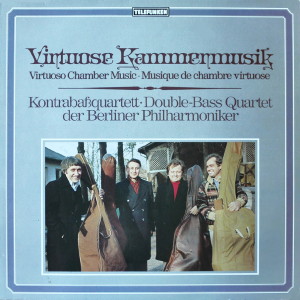 |
1 LP -
Telefunken 6.42527 AP (p) 1981
|
|
| VIRTUOSE KAMMERMUSIK -
Kontrabaßquartett |
|
|
|
|
|
|
|
| David Funck
(1629-1690) |
Adagio
et Allemande - (Besetzung: 2,
1, 3, 4) |
|
4' 17" |
A1 |
| Bernhard Alt
(1903-1945) |
Suite
für vier Kontrabässe
- (Besetzung:
2, 3, 1, 4) |
|
12' 13" |
A2 |
| Theodor Albin
Findeisen (1881-1936) |
Präludium
- (Besetzung:
1, 2, 3, 4) |
|
2' 23" |
A3 |
| Wolfgang
Amadeus Mozart (1756-1791) |
Ave verum
corpus D-dur, KV 618
(Bearbeitung für vier Kontrabässe
von Erich Hartmann) - (Besetzung:
2, 3, 1, 4) |
|
2' 46" |
A4 |
| Helge
Jörns
(geb. 1941) |
Mobile
Perpetuum - (Besetzung:
1, 2, 3, 4) |
|
5' 48" |
B1 |
| Paul Chihara (geb. 1938) |
Logs - (Besetzung:
1, 2, 3, 4) |
|
10' 04" |
B2 |
| Erich
Hartmann (geb. 1920) |
Quartett
- (Besetzung:
1, 2, 3, 4) |
|
9' 31" |
B2
|
|
- Sostenuto ·
Allegro / Largo / Saltarello ·
Presto |
|
|
|
|
|
|
|
|
| Kontrabaßquartett
der Berliner Philharmoniker |
| - Klaus Stoll
- 1 |
| - Friedrick Witt
- 2 |
| - Erich Hartmann
- 3 |
| - Wolfgang Kohly
- 4 |
|
|
|
|
Luogo
e data di registrazione |
|
-
|
|
|
Registrazione:
live / studio |
|
studio |
|
|
Recording
Supervision
|
|
-
|
|
|
Edizione LP |
|
TELEFUNKEN
- 6.42527 AP - (1 LP - durata 47'
59") - (p) 1981 - Analogico |
|
|
Originale LP
|
|
- |
|
|
Prima Edizione CD |
|
-
|
|
|
Note |
|
-
|
|
|
|
|
David
Funck's "Adagio
and Allemande"
come from the
well-known Suite
for Four Viols by
this Czech
Renaissance
master. The
performance of the
music on four
double-basses -
the closest
descendant of the
viol in the modern
'family' of
stringed
instruments -
gives the listener
an idea of the
original sound.
Bernhard Alt's
"Suite for Four
Double-Basses" was
the first original
quartet to be
composed for this
unusual ensemble.
Four members of
the already widely
celebrated
double-bass
section of the
Berlin
Philharmonic gave
the Suite its
first performance
in 1933. The great
success of this
occasion
encouraged the
ensemble to give
many more
performances,
including some in
the Berlin
Philharmonic's
subscription
concert series,
and inspired other
composers to write
similar works.
Among these is the
"Präludium"
(Prelude) - again
a quartet suite in
four movements -
written by Theodor
Albin Findetsen in
1934. The work,
composed in the
tradition of Max
Reger, caused four
double-bass
players of the
Leipzig Gewandhaus
Orchestra to form
a Double-Bass
Quartet. Mozart's
"Ave Verum",
arranged for
double-basses by
Erich Hartmann,
brings out the
instrument's most
attractive side,
its melodious
powers of
expression. Helge
Jörns's "Mobile
Perpetuum",
written for the
Philharmonic
Double-Bass-Quartet
in 1976, takes a
humorous view of
the bass-player's
world, with
harshly plucked
staccati, menacing
pizzicati, a
plaintivi
rebelliousness in
the trio, and
finally a return
to those dark
sounds peculiar to
the instrument.
Paul Chihara‘s
"Logs" for four
double-basses
(composed 1974)
belongs to the
series "Music of
Trees", which all
of Japan's
best-known
composers have
contributed to.
These works, with
their frugally
distributed wooden
elements, lie
close to the
meditative
radiance of Zen
Buddhism.
Chihara's work
paints a picture
of logs floating
slowly downstream
on a wide river.
Erich Hartmann, a
bass-player with
the Berlin
Philharmonic, has
written a number
of virtuoso pieces
for the
Double-bass
Quartet since the
ensemble was
refounded in 1967.
The three-movement
quartet of
Hartmann's
recorded here is
an impressive
testimony to the
high standard of
present-day bass
playing.
Klaus
Stoll
(Translation:
Clive
Williams)
··········
Klaus
Stoll was
born in 1943. A
pupil of Heinz
Detering, he was
already a member
of the Niederrhein
Symphony Orchestra
at 15; in 1965 he
joined the Berlin
Philharmonic, and
two years later
became the
orchestra's
principal
double-bass. In
1970 he began his
career as a
soloist, in the
course of which he
has undertaken
concert tours
world-wide, and
has made numerous
gramophon
recordings of
virtuoso works of
all periods. Stoll
plays a
double-bass built
by Giovanni Paolo
Maggini, Brescia,
anno 1617.
Friedrich Witt,
born 1930, became
Germany's youngest
bass-player when,
at the age of 20,
having studied at
the Folkwangschule
in Essen, he
joined the Münster
Civic Orchestra.
After posts in
Duisburg and
Frakfurt, he
joined the Berlin
Philharmonic in
1954 as a solo
bass-player. Witt
is an active
chamber musician
(he also plays the
recorder and
harpsichord), and,
since 1972, has
been teaching at
the Orchestra's
Academy. For this
recording he used
alternately an
antonio Mariani
instrument of
1667, and one
built by
Giovanetti de
Lucca in 1839.
Erich Hartmann,
born 1920, has
been playing
double-bass with
the Berlin
Philharmonic since
1943. In addition
to his activities
as a musician, he
has composed a
considerable
number of works,
with the emphasis
on solo pieces,
sonatas, duos,
trios, quartets
and even an octet,
all for
double-bass.
Hartmann's works
receive frequent
performance today
from bass-players
all over the
world. His first
Double-Bass
Quartet is
recorded here for
the first time.
Wolfgang Kohly,
born 1944, has
been a bass-player
in the Berlin
Philharmonic since
1967, and was one
of the founders of
the orchestra's
Double-bass
Quartet; he has
given concerts and
made radio
broadcasts with
the Quartet in
Saarbrücken,
Freiburg, Berlin,
Salzburg, Tokyo
... With his
five-stringed
instrument built
by the Bolzano
master Matthias
Albanus, Kohly
forms the
foundation of the
Berlin
Philharmonic
Double-Bass
Qurtett in all the
pieces on this
record.
|
|
|

